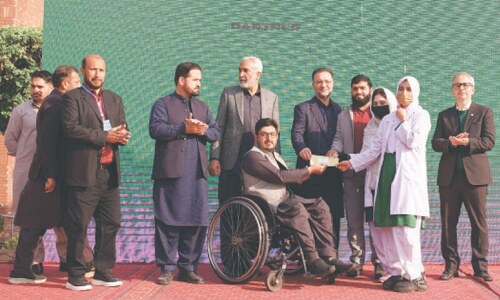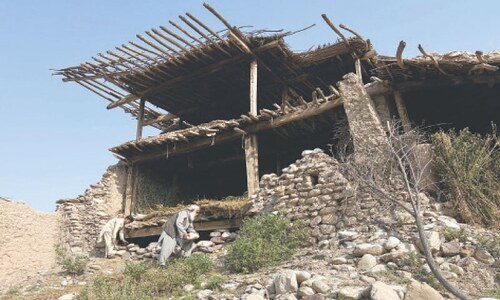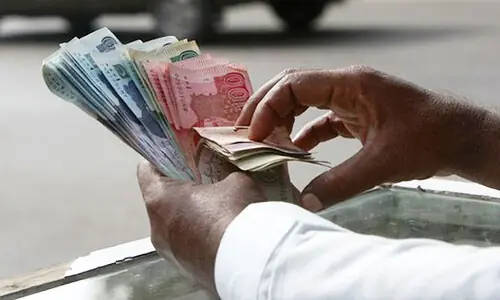
A woman manning an election office in Pakistan's fiercely patriarchal north is a rare sight, and the novelty of stumbling across one is made all the more enjoyable by the obvious misery of heavily bearded plaintiffs who are obviously not used to the idea of a woman being in charge.
Amid a lot of confusion about gender roles, appropriate behaviour and social taboos, Ali Begum Khan has kicked off an election campaign in an area where a woman has never treaded this path before.
Ms Khan, a retired bureaucrat, has chosen perhaps one of the rockiest roads. However, she is optimistic about her chances as she considers it a great advantage to be an educated candidate appealing to educated women and men, who she says never vote.
She comes to office early every morning, discusses election plans with aides, and receives people who bring her their complaints. After attending scheduled meetings, she visits villages to canvass voters. She visits far flung settlements and delivers speeches at separate corner meetings for men and women.
“I got very used to dealing with men during my professional career and interacting with my own people is not an issue,” Ms Khan says with a smile.
Cognisant of the region's deeply entrenched customs, however, she slightly bows her chaddar-covered head in deference whenever a male visitors enter her office.
Ali Begum Khan will be contesting polls in Kurram against 23 men
Her main office is out of bound for women voters. Only men can be seen coming and leaving the space. Some feel visibly awkward when they enter her office, which is situated in the middle of a compound. They cannot seem to decide how to appropriately interact with a woman at the age of 60: to shake hands or not seems to be a matter of particular concern.
There is a separate office for women in the main town and Ali Begum is setting up committees to mobilise female voters.
“They [women] are my real strength. I have broken a taboo and women will come out in my support,” says Ms Khan. The taboo refers to her being only the second woman contender from the erstwhile tribal areas to be taking part directly in the general elections.
Her candidature has left a sharp mark on the women in her constituency. She regularly receives invitations from villages to address corner meetings of enthusiastic locals who want her to guide them in the electoral process.
She is the only woman candidate contesting for NA-46, TA-VIII. She is up against 23 male contenders in a remote area that remains as conservative, patriarchal and male-dominated as they come.
But “I have an edge over all my rivals, because I have equal access to both male and female voters,” she acknowledges.
Contesting elections against the feudal system is like taking a bull by the horns, yet Ms Khan has remained politically independent. She is up against political parties who have allotted tickets to the bankable 'electables' in Kurram. One of her main competitors is PPP ticket-holder and two-time winner Sajid Ali Turi, who belongs to an influential local family. His grandfather, Nawab Naseerullah Khan, had once served as MNA in Field Marshal Gen Ayub Khan’s 'basic democracy' system of governance.
Her second potential rival is Syed Iqbal Mian, a candidate of the PTI. He belongs to the 'spiritual' Shah Syed Mian family, which has thousands of followers in Kurram and adjacent Orakzai. His uncle, late Khail Syed Mian and first cousin Sajjad Syed Main, have served as senators. Iqbal Mian’s first cousin, Muneer Mian, is also contesting polls as independent candidate.
Syed Irshad Hussain, a retired police officer and brother of retired air marshal Syed Qaisar Hussain, a runner up in the 2013 elections, is also in the race. His brother was a PPP candidate in the 2008 elections.
A young chap, Ibrar Jan, is popular in the western belt of Kurram.
Splits in the PPP and the contest of Muneer Mian against his cousin and PTI candidate Iqbal Syed can benefit Ms Khan.
Importantly, the powerful Anjuman-i-Hussania, a body of Turi-Bangash tribes, and the Khateeb of the Central Jamia Mosque have publicly distanced themselves from the election process. Both entities apparently do not support any candidate in the wake of controversy in the 2013 general elections. These two entities had openly supported Sajid Turi, who won this seat twice, in the previous elections.
Winning am election in this deeply patriarchal and tribal society will not be a cakewalk for a woman candidates. Money talks when it comes to winning an election, and Ms Khan does not have many resources or the support of major political parties like her rivals do.
She is focusing on revitalising old contacts she had developed with the people of Kurram during her three-decade career in Pakistan's bureaucracy.
“I have good reputation and worked for the area. A woman is contesting elections against 23 males, but success will be mine,” she says with confidence.
Published in Dawn, June 22nd, 2018


































